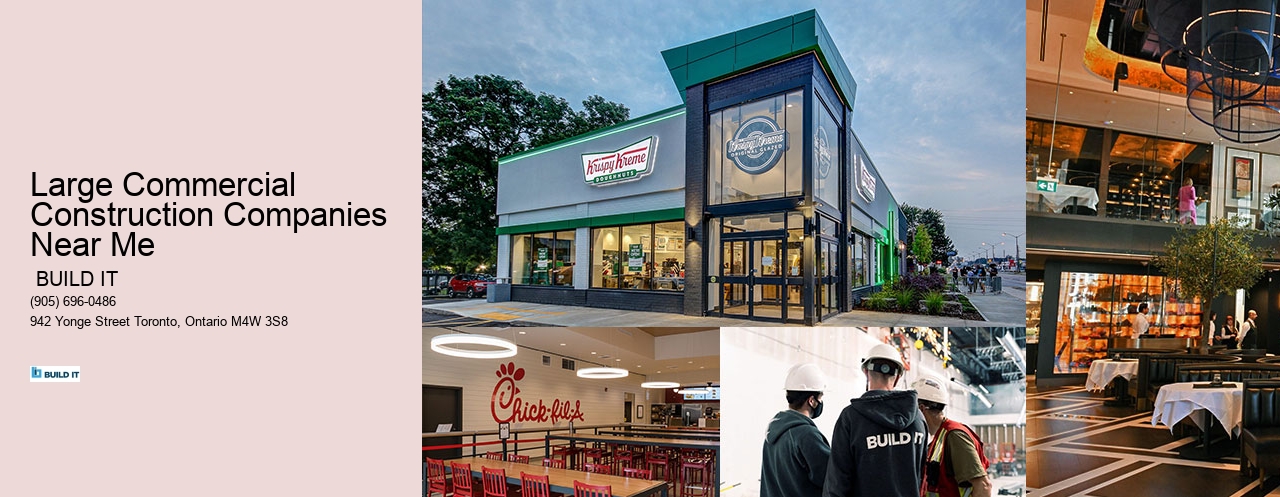

At BUILD IT Toronto, we design and build purpose-driven commercial and industrial spaces that help businesses flourish in one of Canada’s most fast-paced cities. Our expertise in quality construction, coupled with a collaborative approach, makes us the go-to partner for entrepreneurs and national brands alike. From retail and hospitality on Queen West to medical offices in North York and logistical facilities in Scarborough, our work can be seen across the city—and we’re just getting started.
We’re more than general contractors—we’re end-to-end builders. Our services span pre-construction planning, permit coordination, full design-build execution, and final delivery. Keeping the entire process under one roof lets us work more efficiently and communicate more clearly—ensuring your project stays on time and within budget.
With deep roots in Toronto, we understand the local challenges—from intricate zoning regulations to working in high-density environments. Our experienced teams have delivered successful builds across the GTA, including in Mississauga, Etobicoke, Vaughan, and the city core.
We bring this local knowledge to every sector we serve: restaurants, retail stores, healthcare clinics, office spaces, industrial builds, and franchise expansions. Every project is guided by strict safety standards and building codes, while also being thoughtfully designed for day-to-day use.
What truly sets us apart is how we treat our clients. We see each project as a partnership, listening first and tailoring our strategies to your needs. Real-time tools keep you informed, while our experienced team ensures quality and clarity throughout.
If you’re planning a build or renovation in Toronto, choose BUILD IT Toronto for a space that’s functional, stunning, and built for success. Let’s build something exceptional—together.

Commercial construction is a broad field that encompasses the building and leasing of spaces within the commercial sector, including offices, retail centers, warehouses, and industrial buildings. These projects are typically designed to generate income for owners or investors. Residential construction, on the other hand, focuses on housing individuals or families and includes single-family homes, apartments, condominiums, and townhouses. The purpose of each type dictates unique approaches to planning and design — commercial projects must consider factors like foot traffic and parking space for customers while residential builds prioritize comfort, privacy, and practicality for living.
The choice of materials in commercial construction often leans towards durability and adherence to stricter building codes due to higher public usage. Steel frame structures are common in skyscrapers or large shopping complexes for their strength. In contrast, residential construction frequently employs wood framing due to its cost-effectiveness and aesthetic appeal for smaller-scale buildings. Design complexity also varies; commercial projects may require sophisticated architectural designs that incorporate advanced mechanical systems for elevators or escalators as well as specialized infrastructure like loading docks or refrigeration units in warehouses.
Navigating legalities presents distinct challenges in both sectors. Commercial contractors must adhere to a stringent set of local zoning laws, building codes, fire regulations, Americans with Disabilities Act (ADA) requirements among others that dictate how a structure can be used commercially. These regulations ensure public safety in environments where people work or shop. Residential constructions comply with less rigorous standards but still follow important guidelines ensuring dwellings are safe and habitable with proper electrical wiring, plumbing systems, insulation levels among other considerations.
Economically speaking, the scale of investment differs significantly between the two types of construction. Commercial projects generally involve more stakeholders including developers, investors
| Commercial Construction & Expansion Services | |
|---|---|
| Commercial Construction Services | Full-service construction solutions for new builds, additions, and renovations. |
| Commercial Construction Management Companies | Professional management teams overseeing timeline and budget compliance. |
| Commercial Projects Contractor | Reliable contractors for office buildings, retail stores, and warehouses. |
| Construction Commercial Companies | Experienced firms focused on efficient, code-compliant structures. |
| Contractors Commercial | Qualified commercial contractors for multi-unit and large-scale jobs. |
The journey of constructing a new commercial facility begins with a comprehensive planning phase. Stakeholders, including business owners, investors, and potential tenants, come together to outline the project's vision. Architects and engineers are then engaged to translate this vision into detailed designs, taking into account zoning laws, building codes, and environmental regulations. During this stage, the feasibility of the project is scrutinized through market studies and financial modeling to ensure its viability. The design process is iterative, with client feedback guiding revisions until a final plan is approved.
With plans in place, attention shifts towards forming the legal backbone of the construction—the contract. This document delineates responsibilities among all parties involved: owners, contractors, subcontractors, and suppliers. Negotiations aim to establish clear terms regarding scope of work, timelines, payment schedules, quality standards and dispute resolution mechanisms. Upon successful contract negotiations comes procurement; acquiring all necessary materials and securing skilled labor vital for the build. This step requires careful coordination to maintain budget constraints while ensuring high-quality resources are obtained.
Ground-breaking signifies the onset of construction activity on-site. A seasoned project manager oversees day-to-day operations ensuring that work proceeds according to plan—adhering strictly to timelines without compromising on safety or quality standards set forth in the contract. Progress is monitored against milestones as diverse teams—from framers to electricians—execute their tasks in synergy under strict compliance with local regulations. Unanticipated challenges such as weather delays or material shortages are addressed promptly with solutions that keep the project on course.
As construction nears completion, there’s an increased focus on inspections and finishing touches—installing fixtures, painting walls, laying carpets—all essential elements that transform a structure into a functioning commercial space ready for occupancy. Final inspections by government bodies ensure that everything meets statutory requirements before certificates of occupancy can be issued. Once these hurdles are cleared successfully comes handover: delivering control from builders to owners who then prepare for opening day or lease their new state-of-the-art facility with confidence knowing it has been built to specification—and more importantly—to contract.

Yes, most reputable firms manage permitting, inspections, and ensure all work meets local codes.
Design-build integrates design and construction under one contract, streamlining communication and timelines.
They schedule, oversee, and ensure each trade aligns with project goals, timelines, and safety standards.